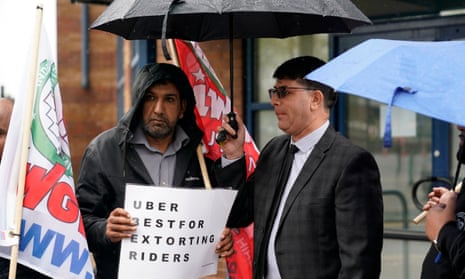Uber drivers have gone on strike in the UK, US and other countries including Brazil and Australia to demand better pay and conditions ahead of the ride-hailing app’s stock market debut.
Thousands protested against what one UK trade union labelled “poverty pay” ahead of Friday’s flotation, which will crystalise multi-million and multi-billion dollar fortunes for early investors, including the Uber founder, Travis Kalanick, and the Amazon boss, Jeff Bezos. Uber hopes to raise $9bn (£6.9bn) in new funds and is expected to be valued at up to $91.5bn when the valuation of the shares is announced on Thursday.
The protests took place in London, Birmingham, Nottingham and Glasgow as well as 10 US cities, including Chicago, Boston, Los Angeles, New York, San Francisco and Washington DC, and in other countries. In the US, strikers were also joined by drivers from industry rival Lyft.
Many UK drivers turned the Uber app off to withhold their services between 7am and 4pm on Wednesday. About 30 drivers and union representatives protested outside Uber’s UK headquarters in east London,, unfurling a banner that read: “Billions to bosses, poverty pay for drivers.”
The London protests were organised by the Independent Workers of Great Britain union. The union demands an increase in fares to £2 per mile from £1.25; a cut in the commission paid by drivers to Uber from 25% to 15%; employment status for drivers which means they get paid the minimum wage and receive holiday and sick pay; and an end to unfair dismissals.
Drivers told the Guardian that when Uber cuts them off the app in response to customer complaints, there is no way for them to appeal.
Mahboob Alam, who has been an Uber driver for four years, said: “It’s not right if people like Travis make many more billions and drivers have to work longer and longer hours.”
He said he had been “deactivated” for two weeks last month, which meant he could not work. He added that Uber had cut fares four times since 2012 and its low fares had driven some of its competitors out of business.
Analysis by the union suggests Uber drivers in the UK earn £5 an hour on average, well below the legal minimum wage of £8.21 for those over 25. Uber says an Oxford University study found the average driver in London makes more than £11 per hour after costs, including Uber’s service fee.
James Farrar, the union’s chair, said: “We want to send a signal to investors coming in that they have to find another route to profitability, rather than cutting drivers’ pay.”
In New York, some drivers went offline between 7am and 9am, while drivers in Los Angeles participated in a 24-hour strike.
Brendan Sexton, executive director of the union Independent Drivers Guild in New York, said: “Drivers built these billion dollar companies and it is just plain wrong that so many continue to be paid poverty wages while Silicon Valley investors get rich off their labour. All drivers deserve fair pay.”
Uber said it had made a number of improvements in benefits, including providing free insurance and telephone support for “qualifying drivers”. About 1.1 million drivers are set to share in a $300m payout relating to the flotation.
The UK union argues, however, that the flotation-related cash grant each driver will get is less than what they are owed in backdated holiday pay.
Uber in December lost an appeal against a UK landmark employment tribunal ruling that its drivers should be classed as workers, and wants to appeal to the supreme court.
